
 i_need_contribute
i_need_contribute

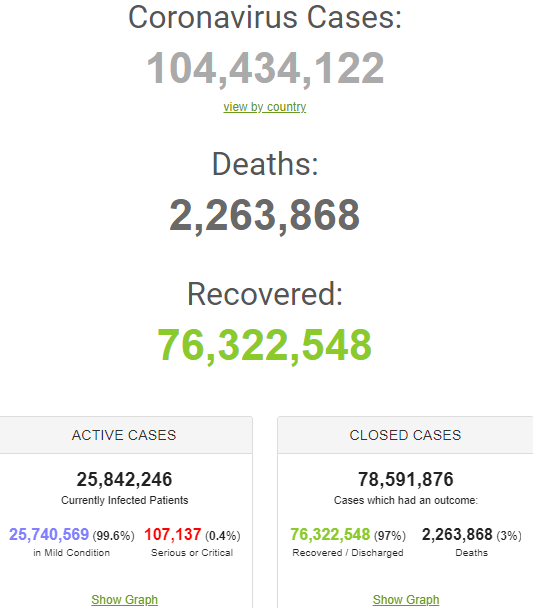
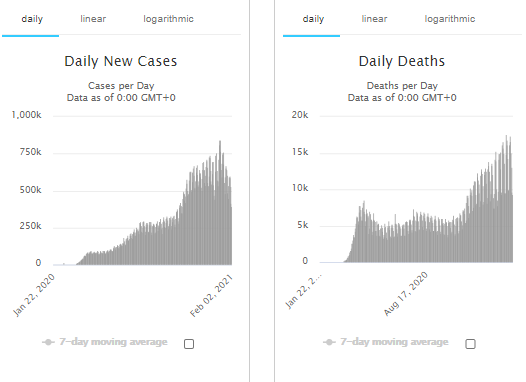
|
Country, |
Total |
New |
Total |
|
World |
104,384,897 |
+452,050 |
2,262,288 |
|
27,027,347 |
+114,703 |
457,856 |
|
|
10,778,206 |
+11,000 |
154,635 |
|
|
9,286,256 |
+56,240 |
226,383 |
|
|
3,884,730 |
+16,643 |
74,158 |
|
|
3,852,623 |
+16,840 |
108,013 |
|
|
3,224,798 |
+23,337 |
77,238 |
|
|
2,881,793 |
+29,064 |
59,805 |
|
|
2,570,608 |
+9,660 |
89,344 |
|
|
2,492,977 |
+7,795 |
26,237 |
|
|
2,239,943 |
+7,627 |
59,386 |
|
|
2,114,597 |
+10,091 |
54,576 |
|
|
1,943,548 |
+9,695 |
48,426 |
|
|
1,869,708 |
+5,448 |
159,100 |
|
|
1,520,215 |
+4,326 |
37,476 |
|
|
1,458,958 |
+2,649 |
44,946 |
|
|
1,431,416 |
+6,820 |
58,110 |
|
|
1,223,879 |
+2,394 |
22,924 |
|
|
1,149,764 |
+7,048 |
41,354 |
|
|
1,099,687 |
+10,379 |
30,581 |
|
|
994,600 |
+7,184 |
16,607 |
|
|
985,224 |
+3,561 |
14,108 |
|
|
786,420 |
+2,831 |
20,213 |
|
|
734,035 |
+3,147 |
18,559 |
|
|
732,732 |
+2,676 |
18,513 |
|
|
731,861 |
+5,540 |
13,017 |
|
|
711,417 |
+1,264 |
21,124 |
|
|
659,978 |
+7,732 |
4,887 |
|
|
621,755 |
+1,135 |
13,068 |
|
|
547,648 |
+1,220 |
11,746 |
|
|
536,107 |
+525 |
8,149 |
|
|
528,852 |
+1,582 |
10,874 |
|
|
472,273 |
+835 |
8,309 |
|
|
416,763 |
+1,241 |
7,847 |
|
|
398,905 |
+1,903 |
4,056 |
|
|
391,626 |
+2,108 |
5,794 |
|
|
369,288 |
+578 |
12,656 |
|
|
368,639 |
+310 |
6,383 |
|
|
329,194 |
+1,132 |
4,334 |
|
|
322,201 |
+1,098 |
5,339 |
|
|
309,649 |
+3,310 |
866 |
|
|
305,842 |
+2,770 |
3,226 |
|
|
271,289 |
+171 |
2,030 |
|
|
259,209 |
+858 |
3,208 |
|
|
252,094 |
+1,737 |
4,784 |
|
|
251,279 |
+293 |
14,915 |
|
|
249,994 |
+699 |
1,737 |
|
|
232,907 |
+387 |
5,071 |
|
|
230,455 |
+159 |
3,141 |
|
|
222,628 |
+3,455 |
791 |
|
|
220,547 |
+967 |
9,178 |
|
|
218,299 |
+1,464 |
10,439 |
|
|
215,920 |
+834 |
2,704 |
|
|
211,412 |
+1,367 |
6,893 |
|
|
199,357 |
+397 |
2,160 |
|
|
198,424 |
+871 |
3,418 |
|
|
195,009 |
+440 |
2,641 |
|
|
189,131 |
+1,161 |
2,476 |
|
|
183,448 |
+550 |
2,847 |
|
|
168,486 |
+1,650 |
3,541 |
|
|
167,231 |
+143 |
3,089 |
|
|
167,013 |
+521 |
9,407 |
|
|
166,654 |
+811 |
960 |
|
|
160,725 |
+639 |
3,462 |
|
|
160,299 |
+667 |
5,709 |
|
|
159,956 |
+513 |
1,849 |
|
|
158,716 |
+1,221 |
5,851 |
|
|
152,095 |
+375 |
249 |
|
|
148,951 |
+1,108 |
3,614 |
|
|
138,861 |
+477 |
2,116 |
|
|
134,685 |
+161 |
1,532 |
|
|
134,482 |
+701 |
2,750 |
|
|
133,552 |
+1,634 |
1,613 |
|
|
127,752 |
+406 |
1,202 |
|
|
120,434 |
+1,032 |
1,896 |
|
|
107,841 |
+263 |
2,898 |
|
|
104,239 |
+657 |
376 |
|
|
101,009 |
+153 |
1,766 |
|
|
93,160 |
+407 |
2,873 |
|
|
89,594 |
+30 |
4,636 |
|
|
84,646 |
+58 |
1,414 |
|
|
79,934 |
+942 |
1,398 |
|
|
78,844 |
+336 |
1,435 |
|
|
78,801 |
+46 |
621 |
|
|
67,782 |
+772 |
424 |
|
|
67,427 |
+775 |
1,219 |
|
|
8,497 |
+48 |
156 |
|
|
7,028 |
+42 |
59 |
|
|
1,882 |
+32 |
35 |
Retrieved from: https://www.worldometers.info/coronavirus/
From CNN's James Griffiths and Sandi Sidhu
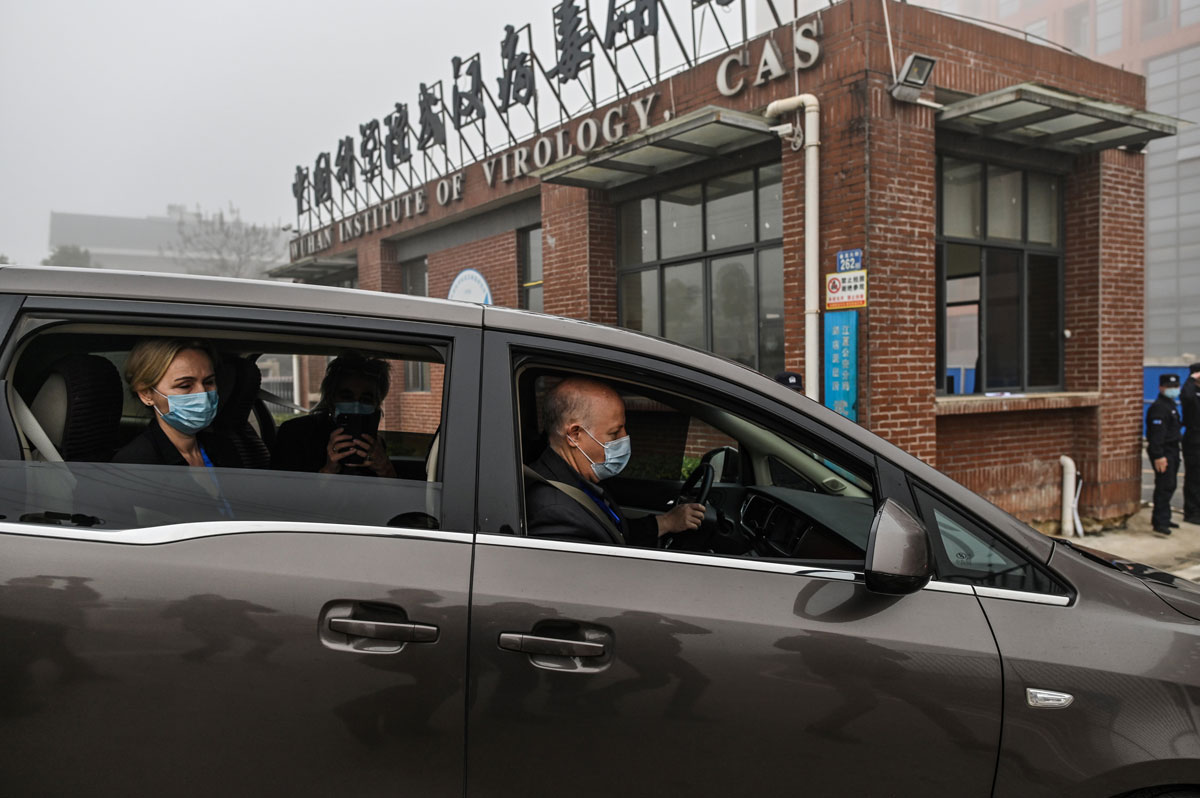
Peter Daszak (R), Thea Fischer (L) and other members of the World Health Organization team investigating the origins of Covid-19 arrive at the Wuhan Institute of Virology in China's central Hubei province on February 3. Hector Retamal/AFP/Getty Images
A team of World Health Organization investigators in Wuhan are visiting a laboratory Wednesday that has been the focus of conspiracies and speculation about the origin of the coronavirus pandemic.
The WHO investigators began research in the central Chinese city last week, after a 14-day quarantine and bureaucratic delays. Their work has been subject to intense scrutiny and political pressure from both within China and outside the country.
Few places they are visiting are as controversial as a laboratory run by the Wuhan Institute of Virology, which officials in former US President Donald Trump's administration suggested, without providing evidence, could have been the origin of the coronavirus.
The lab in question, which is affiliated with the central government-run Chinese Academy of Sciences, is the only one in mainland China equipped for the highest level of biocontainment, known as Biosafety Level 4 (BSL-4).
BSL-4 labs are designed to study the world's most dangerous pathogens -- those that pose a high risk for transmission, are frequently fatal and most often have no reliable cure, such as coronaviruses.
Lab led by China's "bat woman": The Wuhan lab was created in the wake of the deadly severe acute respiratory syndrome (SARS) epidemic, which swept through China and other parts of Asia in 2002 and 2003.
In particular, the Wuhan lab team led by virologist Shi Zhengli, known as China's "bat woman" for years of virus-hunting expeditions in bat caves, has focused on bat-borne coronaviruses, exactly what the current pandemic is believed to have been caused by.
Bats are a major reservoir for viruses, and though they do not suffer from them thanks to natural resistance, they are known carriers of many infectious pathogens that are devastating for humans, including Ebola, rabies, SARS, and Middle East respiratory syndrome (MERS). Current scientific consensus is that SARS-Cov-2, the virus behind the Covid-19 pandemic, also evolved in bats and then spread to humans, potentially with an intermediary animal host.
From CNN's Zamira Rahim
After criticism last year for an early rollout, Russia's Sputnik V vaccine is 91.6% effective against symptomatic Covid-19 and 100% effective against severe and moderate disease, according to an interim analysis of the vaccine's Phase 3 trial results.
The preliminary findings were published in The Lancet on Tuesday and are based on data gathered from 19,866 participants, of which around three-quarters (14,964) received two doses of the vaccine and a quarter (4,902) were given a placebo.
Sixteen cases of symptomatic Covid-19 were confirmed in the vaccine group 21 days after participants received the first vaccine dose. Sixty-two cases were found in the placebo group -- equating to an efficacy of 91.6%.
The trial included 2,144 people over the age of 60 and a sub-analysis conducted on this group revealed the vaccine was well tolerated and had a similar efficacy of 91.8%.
The team also analyzed the efficacy of the vaccine against severe and moderate Covid-19 disease and 21 days after the first dose no severe or moderate cases were reported in the vaccinated group, while 20 were reported in the placebo group.
Serious adverse events were also rare and none was considered to be associated with vaccination. The majority of side-effects that were reported were mild, such as pain at the injection site, flu like symptoms and low energy levels, according to the study.
The analysis includes only symptomatic cases of Covid-19, however, and the authors note more research is needed to understand the vaccine's efficacy against asymptomatic Covid-19, transmission and how long protection may last.
The majority of participants in the trial were also White so further research is needed to confirm the results across other ethic groups. The trial is also ongoing and is aiming to include a total of 40,000 participants.
From CNN's Sophie Jeong in Hong Kong
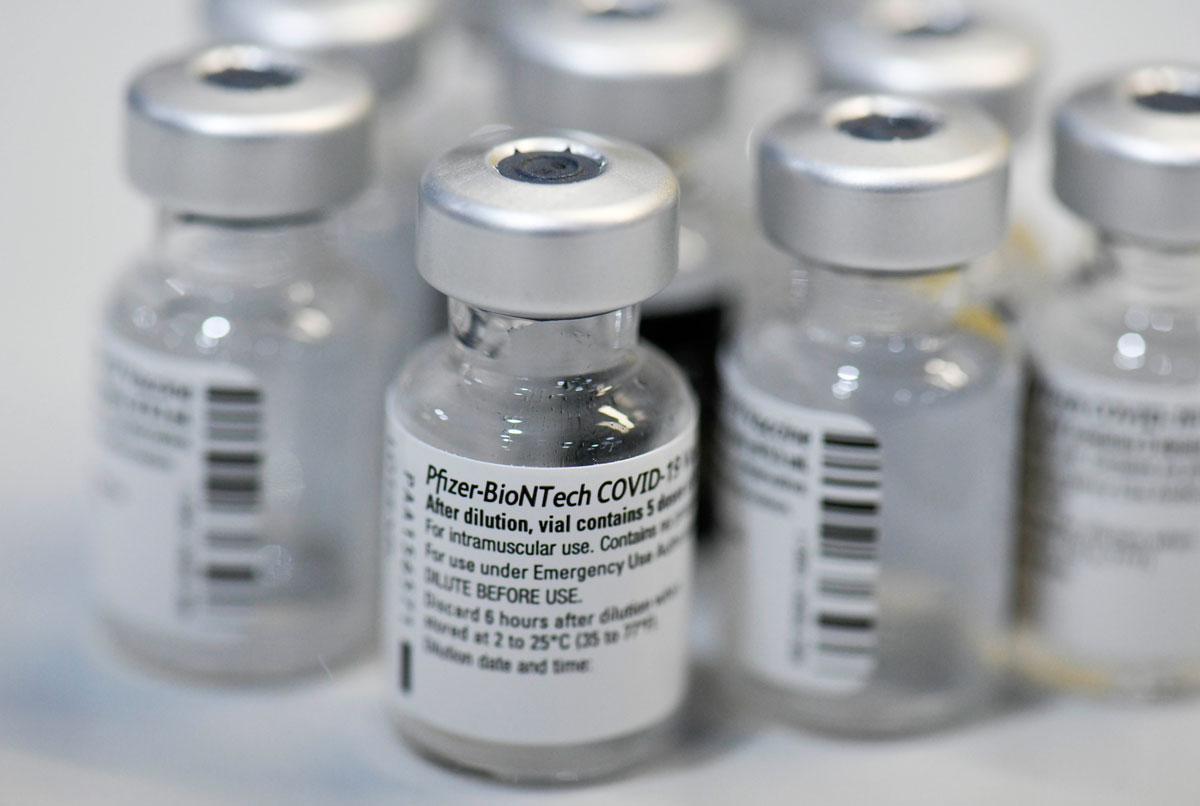
Empty vials of the Pfizer-BioNTech Covid-19 vaccine are displayed at a vaccination center in Ludwigsburg, Germany on January 22. Thomas Kienzle/AFP/Getty Images
New Zealand's medicines regulator has provisionally approved the country’s first Covid-19 vaccine, the government announced on Wednesday.
Medsafe provisionally authorized use of the Pfizer-BioNTech vaccine, which is expected to arrive in New Zealand by the end of the first quarter, according to Covid-19 Response Minister Chris Hipkins.
Provisional approval means the pharmaceutical company must meet certain conditions, including supplying more data from its clinical trials around the world as they progress, the government said in a news release. This will happen at the same time as the vaccine is rolled out.
New Zealand “will start vaccinating first border workers and the people they live with," said Prime Minister Jacinda Ardern. "People such as cleaners, the nurses who undertake health checks in MIQ (Managed isolation and quarantine), security staff, customs and border officials, airline staff and hotel workers will be among the first to get the vaccine.”
“There is more work to do, we are not out of the woods yet -- but the provisional approval of the Pfizer and BioNTech vaccine is a significant milestone," added Director-General of Health Dr. Ashley Bloomfield.
Retrieved from: https://edition.cnn.com/world/live-news/coronavirus-pandemic-vaccine-updates-02-03-21/index.html
By Michael Gold
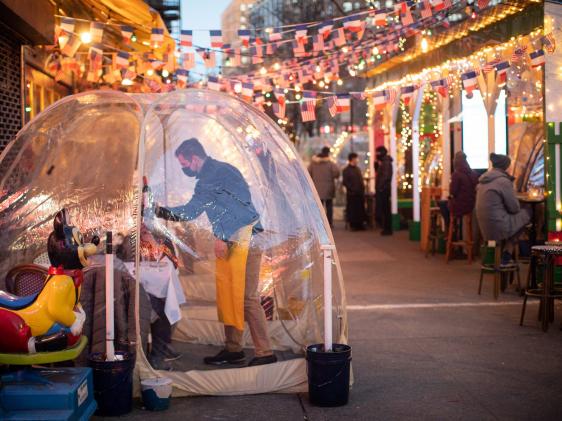
Dining outdoors at Cafe du Soleil on the Upper West Side in Manhattan last month.Credit...Clay Williams for The New York Times
Gov. Andrew M. Cuomo of New York said on Tuesday that local governments could begin to provide coronavirus vaccines to restaurant workers, just one day after he dismissed a debate over expanding vaccine eligibility as “a cheap, insincere discussion.”
Taxi drivers and residents at facilities for the developmentally disabled can also be vaccinated, he said.
Mr. Cuomo linked the changes to an increase in the vaccine doses allocated to New York State by the federal government. On Tuesday, the Biden administration said it would bump the supply given to states by 5 percent, which resulted from an expected increase in manufacturing.
“Now there’s additional flexibility,” Mr. Cuomo said. “And I’m leaving it up to the local governments to make a determination of what fits their situation best.”
The debate over whether restaurant workers should be eligible for the vaccine was kicked off last week, when Mr. Cuomo said he would allow restaurants to New York City to resume indoor dining on Feb. 14.
The governor barred indoor dining in the city in December among concerns over a second wave of the coronavirus. At the time, the Centers for Disease Control and Prevention had released recommendations that described eating at indoor restaurants as a “particularly high-risk” activity, and state contact tracing data suggested that restaurants and bars were the fifth main source of new infections in New York.
Still, while hospitalizations and the seven-day average positive test rate have been trending downward in recent weeks, both remain higher than they were when Mr. Cuomo closed the restaurants. New York City is at an extremely high risk level for coronavirus, according to an assessment by The New York Times and public health experts.
With indoor dining set to restart just as more infectious variants are spreading across the country, many were concerned that restaurant workers returning to their jobs would be putting themselves at increased risk.
On Monday, Mr. Cuomo dismissed the suggestion of expanding eligibility, saying the state did not have the vaccine supply necessary to loosen its criteria and that calling for it to do so was a “cheap, insincere discussion.”
“Yes, I would like to see restaurant workers eligible,” Mr. Cuomo said. “It makes total sense. But what does eligibility mean when you don’t have the supply necessary?"
On Tuesday morning, Mayor Bill de Blasio of New York City said that he believed that restaurant workers should be eligible to receive the vaccine immediately.
“Restaurant workers now are going to be in enclosed places with people eating and drinking,” Mr. de Blasio said. “Every doctor on this line or anyplace else will say that’s an area of concern.”
Retrieved from: https://www.nytimes.com/live/2021/02/01/world/covid-19-coronavirus/amid-mounting-public-frustration-france-resists-a-new-national-lockdown
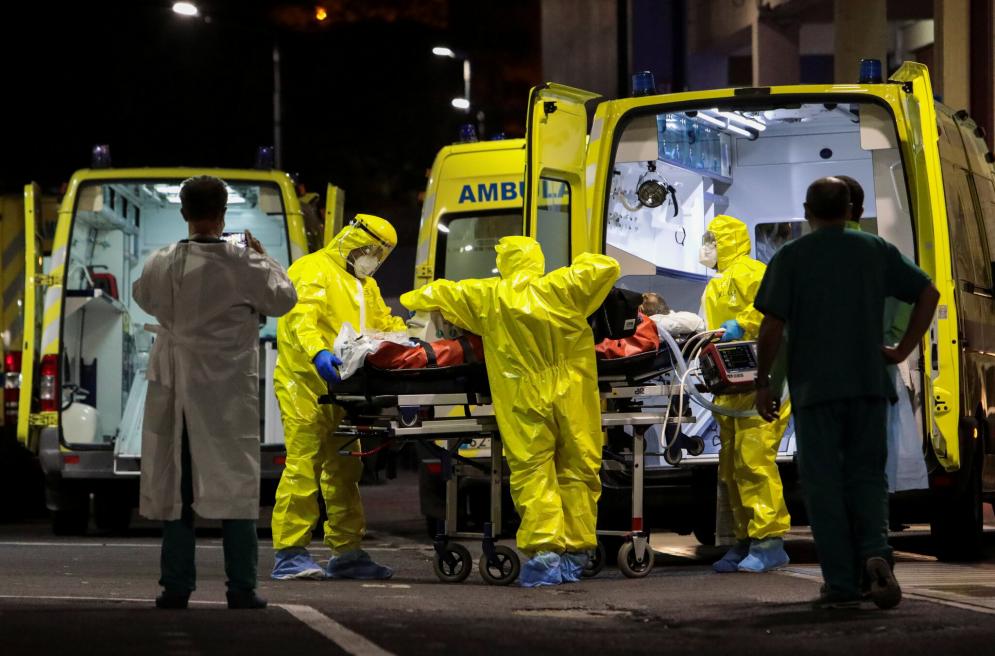
A Covid-19 patient from Lisbon arrived at a hospital in Funchal, on the island of Madeira, Portugal, on Friday.Credit...Duarte Sa/Reuters
Portugal, struggling to contain an outbreak that has led to the highest death rate in Europe, has rapidly filled the beds in intensive care units established for Covid-19 patients and is being forced to create spaces by diverting spaces meant for other critical care patients.
With emergency rooms overwhelmed, particularly in the capital region of Lisbon, hospitals have asked patients to try to treat themselves at home, and the government has reached out to other European countries for assistance.
Some patients have also been airlifted to island hospitals or moved to hospitals in regions not as badly affected.
For those who do show up at hospitals in Lisbon, they are finding a system on the brink, with scores of people lining up outside and waiting to be diagnosed in idling ambulances parked outside.
“We are managing the full capacity of the country,” Pedro Siza Vieira, the Portuguese economy minister, said in a phone interview on Tuesday. While new infections appeared to be falling in some regions, the outbreak in Lisbon was still raging.
“We are looking at a couple of weeks that will be difficult,” he added.
Mr. Siza Vieira himself contracted Covid-19 last month, and about a third of the government’s ministers have also caught the illness recently, or had to isolate after being in contact with a person who had Covid-19.
Portugal, a nation of about 10 million on the Iberian Peninsula, is in the grips of its worst crisis of the pandemic, and 5,000 people died in January.
During the first wave of Covid-19, Portugal was one of the success stories of Europe, after applying a strict lockdown that helped keep its death toll low, particularly in comparison with neighboring Spain.
But since Christmas, Portugal has faced a surge in infections and fatalities.
Government officials have said that the crisis has been amplified by the spread of the Covid-19 variant first discovered in Britain. President Marcelo Rebelo de Sousa of Portugal told a recent news conference that the variant accounted for more than 50 percent of new infections in his country.
Mr. Siza Vieira, the economy minister, said on Tuesday, “We don’t have evidence of the Brazilian variant being significantly active in Portugal while we have evidence that the U.K. variant explains more than half of new cases, particularly in the Lisbon area.”
However, British officials have expressed their own concern about the spread in Portugal of the variant first discovered in Brazil, leading Britain to announce travel restrictions on its European neighbor.
The travel ban was part of wave of new border closures around the world as countries raced to vaccinate their populations while trying to limit the spread of new variants.
Whatever is driving infections in Portugal, new cases are only now starting to show signs of slowing after a national lockdown was reinstated in mid-January.
The defense minister in Germany, Annegret Kramp-Karrenbauer, said that the country was preparing to dispatch army personnel and equipment to Portugal, noting that all of those deployed would be vaccinated.
And Chancellor Sebastian Kurz of Austria announced on Twitter that his country would welcome some patients transferred from Portugal, without detailing how many.
Ricardo Baptista Leite, an opposition lawmaker in Portugal who is also a medical doctor and head of the public health department at the Catholic University of Portugal, said he was grateful for the support.
“We now have international aid coming in to try to save as many lives as we can,” he said. “But the time will come to assess what went wrong.”
Retrieved from: https://www.nytimes.com/2021/02/02/world/portugal-has-europes-highest-death-rate-and-is-desperately-short-of-hospital-beds.html
By Austin Ramzy

The Canadian Embassy in Beijing. A T-shirt made for embassy staff members who repatriated Canadians from the Chinese city of Wuhan last year has been criticized by the Chinese government.Credit...Andy Wong/Associated Press
To hip-hop fans, it is an instantly recognizable symbol, a flying letter W that represents the Wu-Tang Clan, the New York rap collective.
To the Chinese Ministry of Foreign Affairs, it suggests something else: a bat. And so, when Canadian diplomats in China ordered T-shirts with the symbol behind the word “Wuhan,” it became a minor diplomatic incident.
“The Chinese side is shocked by this and has lodged stern representations with the Canadian Embassy in China, demanding that the Canadian side immediately thoroughly investigate the incident and give China a clear explanation,” Wang Wenbin, a spokesman for China’s Ministry of Foreign Affairs, said during a news conference on Monday.
Bats are considered one of the possible original hosts of the coronavirus that emerged in the central Chinese city of Wuhan in late 2019, and they have appeared in memes about Chinese eating habits that have been criticized as racist. The Chinese authorities have tried to play down the pandemic’s origins in Wuhan, instead pushing dubious theories that the virus may have emerged earlier in Europe, the United States or elsewhere.
A spokesperson for Canada’s foreign service told the Reuters news agency that the T-shirt did not depict a bat.
“The T-shirt logo designed by a member of the embassy shows a stylized W, and is not intended to represent a bat. It was created for the team of embassy staff working on repatriation of Canadians from Wuhan in early 2020,” the spokesperson said by email on Tuesday. “We regret the misunderstanding.”
Relations between China and Canada have been tense since December 2018, when Canada detained Meng Wanzhou, a top executive at the Chinese tech giant Huawei who was wanted on fraud charges in the United States. Two Canadian men, Michael Kovrig and Michael Spavor, were arrested in China soon after in an apparent act of retaliation. They have been accused of espionage and remain held in China under isolated and harsh conditions.
The Dutch prime minister Mark Rutte said on Tuesday that most of the lockdown measures in the Netherlands, many of which have been in place since October, will remain in place for weeks due to fears over a surge in cases as a result of new coronavirus variants.
Rutte’s government, which is currently serving in a demissionary capacity since he resigned on 15 January, is still weighing whether to continue an evening curfew that has triggered rioting in some cities beyond next week, the prime minister told a press briefing.
The government announced earlier this week that primary schools and daycares will reopen on 8 February, adding that it is also looking at possibly reopening secondary schools but that will not happen before March.
“It is inescapable to extend the current lockdown almost entirely until at least March 2,” Rutte said, despite falling case numbers in the Netherlands.
“A third wave is inevitably coming our way,” he said, pointing to new virus strains which are more infectious.
The Netherlands has been in what the government calls a strict lockdown since mid-December and last month imposed a curfew, the country’s first since World War Two, which sparked riots.
The National Institute for Health (RIVM) said on Tuesday there had been 28,628 cases in the past week, down 20% from the week before and the lowest level since lockdown measures were introduced in October.
But this week’s decline “would have been greater without the new variants of the virus that have entered the Netherlands, especially the British variant”, the RIVM said in a statement.
The health minister Hugo de Jonge said on Monday that half of the cases were being caused by the new variant as of 26 January, up from around a third the week before. The government fears it may cause a new wave ahead of 17 March elections.
Here are the key developments from the last few hours:
· Majority of Covid patients develop antibodies that protect from reinfection for at least six months. The vast majority of people who contract coronavirus develop antibodies that may help protect them against reinfection for at least six months, researchers say.Blood samples collected from more than 20,000 UK residents between June and November 2020 revealed that 99% of those who tested positive had antibodies for at least three months, with 88% having them for the full six months studied.
· WHO team visits Chinese virus lab in Wuhan. World Health Organization inspectors visited a laboratory in China’s Wuhan city on Wednesday that American officials suggested could have been the source of the coronavirus. The inspection of the Wuhan virology institute, which conducts research on the world’s most dangerous diseases, will be one of the most-watched stops on the team’s probe into the origins of the Covid-19 pandemic.
· Covid-19 vaccine nationalism is harmful for all, the World Health Organization director-general Tedros Adhanom Ghebreyesus said. He said weak cooperation between nations is a major barrier to achieving worldwide vaccination at the scale needed to end the pandemic.
· Australia’s economy is expected to recover to its pre-pandemic size by the middle of this year – six to 12 months early – the Reserve Bank governor has revealed. On Wednesday, Philip Lowe released the bank’s revised projections showing a faster than expected recovery during the Covid-19 recession is expected to translate to growth of 3.5% this year and next, with unemployment set to fall to 6% in 2021.
· New Zealand giaveprovisional approval to the Pfizer/BioNTech vaccine. The Pfizer/BioNTech vaccine has been provisionally approved for use in New Zealand, where the government will begin vaccinating frontline healthcare and border workers in the coming months.Jacinda Ardern, the prime minister, said the approval was a positive step in the country’s fight against Covid-19, of which there have been fewer than 2,000 cases nationally:
· The number of patients in hospital with coronavirus in France is at its highest since November. The health ministry reported 28,029 people were in hospital with the virus and 3,270 in intensive care. Both numbers set new 2021 highs.
· Macron made ‘end of summer’ vaccine pledge. French President Emmanuel Macron said on Tuesday that all of his countrymen who want a vaccine will be offered one “by the end of the summer”. He told the TF1 channel that 80% of care-home residents - some 500,000 people - would be vaccinated by early March.
· Merkel saidall approved vaccines welcome after Russian Sputnik posted strong data. Germany’s chancellor Angela Merkel has said “all vaccines” approved by the EU’s medicines regulator are welcome, including Russian and Chinese shots, Reuters reports.In a TV interview, she said Germany welcomed the strong data from trials of the Russian Sputnik V vaccine.
· Mexico on Tuesday approved Russia’s Sputnik V coronavirus vaccine for emergency use in the country, one of the worst hit by the pandemic, following the release of positive trial results. The move is a boost to the Latin American nation’s efforts to keep its immunisation program on track in the face of limited supplies from other manufacturers.
· Treasury, World Bank stress need to improve vaccine access for poorest countries. US Treasury Secretary Janet Yellen and World Bank President David Malpass on Tuesday stressed the need to coordinate in responding the global pandemic, improving vaccine access for the poorest countries, and combating climate change.